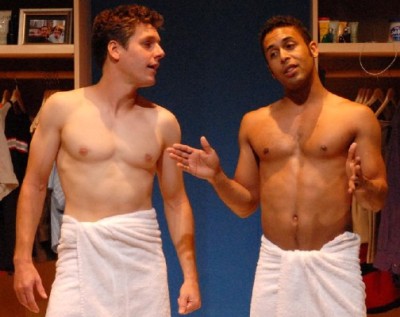Gay men have always had a curious relationship with sports. You’d be hard-pressed to find a gay man who didn’t spend the majority of adolescence coming up with creative excuses to get out of P.E. class. Our half-hearted attempts to participate in team sports — whether prodded by well-meaning parents or forced by overzealous coaches — were usually an exercise in futility. With few exceptions, most us gay boys were too fat, too skinny or just too damn clumsy to “make the team.” The only thing we dreaded more than hitting the playing field (or rather, sitting on the sidelines) was heading back to the locker room. And yet, as young homos — and even more so as adult gay men — we can’t help but be fascinated and more than a little titillated by the goings-on in that damp, smelly, rambunctious chamber of male hormonal angst.
So it’s not surprising that Take Me Out a play set primarily in the locker room of a fictional professional baseball team, has drawn huge audiences of gay men since it premiered in New York in 2003. (Rumor has it that when the show transferred from the intimate Public Theatre to bigger digs on Broadway, some audience members showed up with binoculars.) San Francisco’s New Conservatory Theater’s engaging new production of Richard Greenberg’s 2003 Tony Award-winning play has likewise been playing to packed houses since it opened earlier this month. While it can’t be ignored that a good many of these ticket-buyers are there simply for the visceral pleasure of a luscious parade of male nudity (there were audible gasps when the lights came up on the now-infamous shower scene), Take Me Out also proves to be an enjoyable and occasionally powerful drama that effectively tackles the still taboo subject of gay male sexuality in American professional sports.
At the center of the play is Darren Lemming, the New York Empires’ star center fielder whose almost casual emergence from the closet is the lynchpin of the play. In the hands of a less talented playwright, the character could easily be a cardboard-cutout: a chiseled, loveable, idealized hero for every sissy (or African-American) who ever fantasized of playing in the major leagues. Instead, Greenberg dares to make this all too reluctant hero immensely un-loveable. Brian J. Patterson’s disarming performance in this challenging role meticulously chips away at the self-absorbed, pompous “jock-ness” on the surface, revealing a complex tapestry of conflicted emotions and knee-jerk reactions that keep his character compelling throughout the production.
Other standout performances include an immensely likeable Matt Socha as Kippy Sunderstrom (a character upon which Greenberg heavily relies as both protagonist and narrator); Jeffrey Cohlman’s gripping turn as Shane Mungitt, a dim-witted redneck with vacant eyes and frighteningly expressionless delivery; and Myers Clark as Davey Battle, Lemming’s seemingly stoic best friend and rival, whose surprising revelations figuratively take the play into extra innings.



